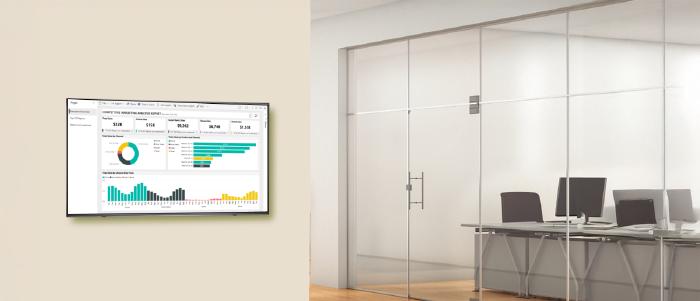
Jan 6 2025
8 min read

The full form of KPI is Key Performance Indicators. KPIs are metrics that allow organizations to track their progress and chalk out the loopholes in their strategies.
The marketing team supplies leads to the sales team. The sales team then converts those leads into paying customers. Some businesses build customer success teams for the next stage. This is the team that continues to engage with your customers and ensure they stay with your company to reduce churn. It is especially important for businesses with monthly subscriptions.
Each team has its own goals, so how should you help your workers stay focused on their goals? Having your KPIs easily visible to your employees can help keep them focused. You can use corporate digital signage software to put up a live KPI dashboard in your team office. It keeps your team up to date and tracks their progress at a glance.
Traditionally, organizations track their KPIs through a worksheet. This type of tracking is commonly issued monthly, quarterly, or annually.
However, there is a lack of agility in that process.
Nowadays, most companies use various software to track live KPIs. These systems can be integrated with digital signage. The popularity of electronic signage is on the rise; one Market Research forecasts a 7.3% increase in the digital signage market growth from 2019 to 2024.
Here are three reasons why you should publish your KPIs on digital signage in the workplace:
**Give real-time employee communication** - Real-time communication is essential in managing a team or an organization. Working in a group means each member must be able to collaborate successfully. If you’re using multiple systems, integrating your applications like ERP software and CRM software with your digital screen software can help track any change as it happens. This keeps your employees on the same page, and consequently, they make informed decisions. The result? Better operational efficiency.
**Boost morale and enthusiasm** - According to Peakon's survey data, only 41% of employees are engaged at work—across 160 countries. Employees are more likely to perform better if they get a complete picture of how their work transpires into business and revenues. Therefore, engaging your staff with a few motivational quotes and internal branding videos is not enough. Your organization must provide the workforce with transparent data so that employees are self-aware of their strengths & pits.
**Encourage healthy competition** - Not all competitions are bad. Healthy contests among the workers and the race to become better can yield a rewarding result for your business. Showing KPIs on your office digital signage can encourage the lower performing employees to buck up, learn, and improve their game.

There can be several types of performance metrics for Sales, Marketing, Management, Customer Service, and IT. The industry and company goals determine the performance indicators for any firm.
Here are five examples of KPIs that you can display on your conference room digital screens:
One important KPI you should consider is the customer effort score (CES). This metric shows how easy it is for your customers to use your product. It’s vital as 94% of customers who experience little effort in using their product or service have a higher chance of purchasing more in the same company. You can get this data by asking your customers to rate your products based on their experience while using them. By measuring it, you can do a survey using the Likert scale. It can be a 5 or 7 point scale with a ‘strongly agree’ to a ‘strongly disagree’ label.
Time to Value measures the amount of time your customers exert before they get value from your product or service. There’s a higher chance of repurchasing if the customer’s time-to-value is shorter. If you fail to manage your product or service value, you’ll lose your customers to your competitors.
Upselling means to increase a sale’s value by offering a more expensive option of the same product. For example, if a customer is interested in buying Laptop A, you’ll offer Laptop B as it’s the more “premium” version with better specs (and higher price.)
Cross-selling also increases a sale’s value but in a different way. You won’t replace what the customer wants to purchase. Instead, you add more similar products. For example, if the same customer who came to buy a laptop purchases a mouse or keyboard (since you convinced her that the mouse would make her life easier!)
This KPI lets you know if your customers find your products valuable. It also helps you determine how easy (or difficult) it is for your customers to interact with your product. These metrics also indirectly reflect the selling efficiency of your sales reps.
Customer retention is vital. Basically, product stickiness measures the customer-product engagement in which you measure the frequency of your customers using your product.
One way to quantify product stickiness is by dividing your daily active users by the monthly active users. The higher the number you get, the better. That means your product is performing well. Another way to help engage your product to your customers is by simply sending them tips and tutorials on using your product.
All customer issues are not the same, but many often are. You can categorize these common issues into groups. This way, it’s easier for you to determine which issues customers face recurrently and find a way to fix them. These are KPIs also help in product improvement and prioritizing customer services.
We live in the 21st century, and in this digital era, firms must realize the importance of faster and more accessible business intelligence. Simply having a KPI excel sheet will not be enough. The management must ensure that these data are conspicuous and constantly visible to the concerned staff. For that, organizations can easily repurpose their existing TV screens or deploy a digital signage solution.
Pickcel’s award-wining digital signage software helps to publish content on digital screens. Whether you want to showcase your products & projects on a digital display or play multimedia content for entertaining your clients, the Pickcel software will help you deliver the right content at the right place. The software offers exciting features like content scheduling, free content apps, and remote screen management. The Pickcel solutions give high ROI for small to large enterprises in any industry.


Jan 6 2025
8 min read

Jan 6 2025
6 min read

Dec 13 2024
5 min read

Dec 13 2024
8 min read
Take complete control of what you show on your digital signage & how you show it.
Start Free Trial Schedule My DemoSee How to Boost Sales & Branding with Digital Signage -40% Less Work, Faster Updates, Better Visibility
Unlock Exclusive Insights